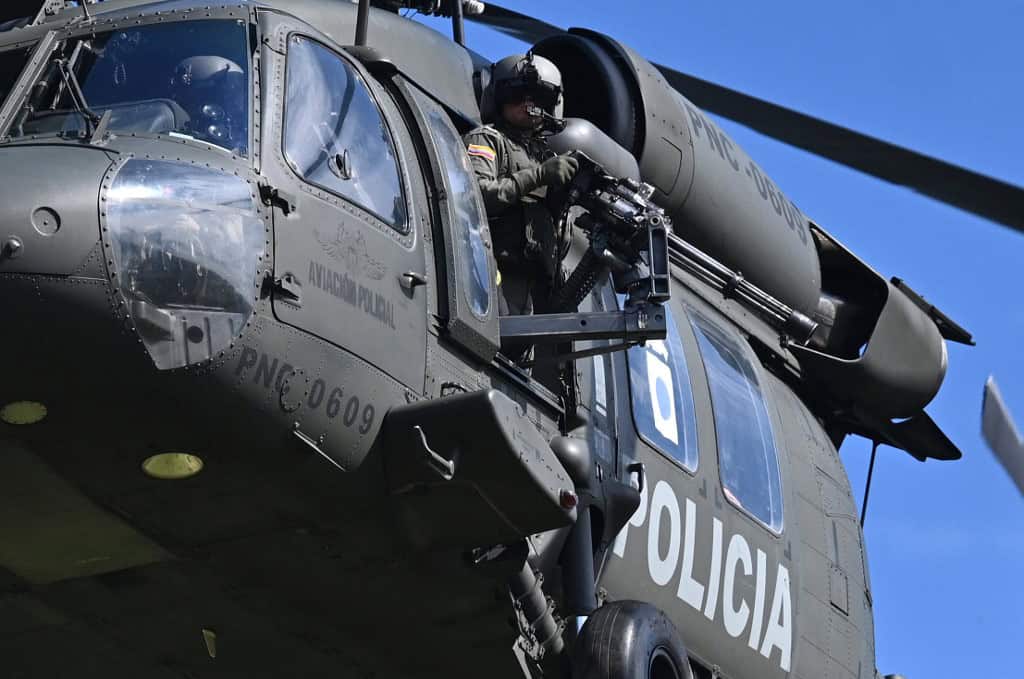If the United States withdraws certification from Colombia as an ally in the fight against drugs, “the drug traffickers win and the nations lose,” warned Colombian Defense Minister Pedro Sánchez in an interview.
Before September 15, Donald Trump’s government must decide whether to continue providing the multimillion-dollar support it gives to Colombia’s military forces to combat cartels and guerrillas financed by cocaine trafficking.
The decision comes at a time when Washington is increasing pressure on Latin American countries to curb the flow of drugs into the United States, and as Colombia faces its worst security crisis in a decade—with multiple attacks, record levels of coca cultivation, and the shooting death of an opposition senator who was running for president.
All this unfolds amid diplomatic tension between Trump and his Colombian counterpart, leftist Gustavo Petro. A fierce critic of the Republican president’s policies, Petro recently questioned the U.S. military deployment in the Caribbean to fight drug trafficking, an offensive also rejected by Venezuela.
On Friday, reporters accompanied Sánchez on a tour of the conflict-ridden department of Putumayo, on the border with Ecuador. The Defense Minister, alongside farmers participating in an official eradication program, pulled coca plants—the main component of cocaine—out of the ground with a shovel.
On his return, the 53-year-old retired air force general said that the potential loss of U.S. anti-drug certification for Colombia would represent a victory for criminal groups. “The illegals win, the nations lose. Certification is, in a way, a symbol of cooperation, alliance, trust, but also of capabilities, of important support so that we can act with greater force,” he said.
Since taking office in 2022, Petro’s government has pushed for a paradigm shift in the war on drugs, which it considers a failure, and seeks instead to attack the social causes that fuel conflict and trafficking.
“We have a totally clear conscience that we have given absolutely everything. There has been absolute commitment here,” Sánchez said. “Colombia is perhaps one of the countries that most forcefully and comprehensively confronts drug trafficking. (…) It may also be the country that sacrifices the most lives,” he added.
Chemotherapy
Dozens of soldiers, three helicopters, and an army member armed with a rifle capable of taking down drones guarded the minister during his visit to Villagarzón, a town in Putumayo.
On Wednesday, a farmer allegedly linked to a guerrilla group negotiating peace with the government attempted to burn alive two soldiers carrying out an anti-drug operation there. Both remain in critical condition.
Experts point to a deterioration of security in Colombia due to Petro’s decisions regarding military operations and his policy of negotiating peace with some groups.
For Sánchez, the violent acts are a reaction to the pressure from law enforcement and anti-drug operations. “When you fight cancer (drug trafficking) and apply chemotherapy (…) there is a reaction,” he said.
Lukewarm Water
Drone attacks against security forces and civilians are becoming increasingly lethal and sophisticated, the minister acknowledged, echoing complaints by international organizations. “Technology changes very quickly, and we have to manage to stay ahead of the threat,” he said.
The Colombian state still does not use combat drones against illegal armed groups, but Sánchez said systems have been improved to counter homemade explosives launched from commercial drones. In the past month and a half, “802 such attacks have been neutralized.” Still, the security forces need a larger budget to strengthen weapons, aircraft, and intelligence equipment, he emphasized.
“If we want security, then we have to invest in security. Don’t ask us to cure cancer with lukewarm water,” he said. Colombia has around 22,000 guerrillas and drug traffickers under arms, according to military intelligence estimates.
The government’s peace project with armed groups has not reduced the military offensive because “the order is to use full force” against them, Sánchez stressed.






